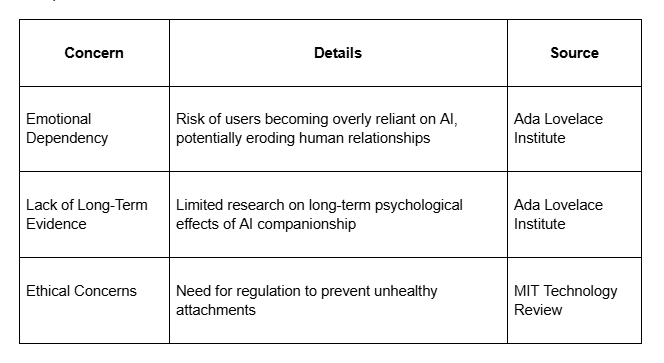Who Benefits Most from AI Companionship, and Why ?
As I explore the world of AI companionship, I’m struck by how this technology is not just a futuristic concept but a present reality that’s already reshaping how we connect with others. From chatbots to virtual assistants and even AI girlfriends, artificial intelligence is stepping into roles traditionally reserved for humans. But who stands to gain the most from this digital evolution, and why? In this article, I’ll identify the groups that benefit most from AI companionship, backed by research and real-world examples, while also addressing the ethical considerations and future implications of this growing trend.
What Is AI Companionship?
Before we dive into who benefits most, let’s clarify what AI companionship entails. It’s a broad term that covers various technologies designed to provide emotional support, conversation, and sometimes physical interaction. These include:
Chatbots like Replika, which engage in text-based conversations and offer emotional support through its AI girlfriend services.
Virtual assistants like Siri or Alexa, which assist with daily tasks but can also provide casual interaction.
Specialized applications, which simulate romantic relationships by engaging in flirtatious banter, emotional support, and role-playing scenarios, catering to users seeking a more intimate form of companionship.
These technologies are designed to simulate human-like interactions, offering empathy, memory of past conversations, and personalized responses. They aim to fill a gap in human connection, especially for those who might struggle to find it in traditional ways.
Why Is Companionship Needed?
In today’s fast-paced, often isolating world, the need for companionship has never been greater. Loneliness is increasingly recognized as a public health concern, with studies showing it can be as harmful as smoking 15 cigarettes a day Forbes. In societies where living alone is becoming more common—such as Japan, where over 1.5 million people live in extreme isolation—the demand for connection is palpable. AI companions are emerging as a solution to this loneliness epidemic, offering a constant presence that can alleviate feelings of isolation.
Groups That Benefit Most from AI Companionship
Through my research, I’ve identified several groups that particularly benefit from AI companionship due to their unique needs and circumstances.
Elderly Individuals
For our elderly population, especially those living alone, AI companions can be transformative. The benefits from AI companionship for this group are profound, addressing both their emotional and physical needs. Here’s how:
Emotional Support: AI companions provide constant availability for conversation, helping to combat loneliness. Studies show that seniors who interact with AI report reduced feelings of isolation and improved mood EnsoRA Health.
Practical Assistance: They can remind users to take medications, alert emergency services in case of falls, and engage in cognitive exercises to keep the mind active.
Improved Well-being: By offering a sense of connection, AI companions enhance overall mental health, which is crucial for aging gracefully.
For example, some AI companions can detect health concerns and alert caregivers, making them a dual-purpose tool for emotional and physical support. The benefits from AI companionship for elderly individuals are particularly significant in societies where aging populations are growing, and social isolation is a pressing issue.
People with Disabilities, Especially Autism
Individuals with disabilities, particularly those on the autism spectrum, often face challenges in social interactions. The benefits from AI companionship for people with autism are particularly noteworthy, as it provides a unique opportunity for social skill development. Here’s why:
Social Skill Development: AI apps like Paradot allow autistic individuals to practice conversation skills in a safe, non-judgmental environment, boosting confidence for real-life interactions Scientific American.
Confidence Building: By offering predictable and consistent interactions, AI helps reduce the anxiety associated with social mistakes.
Therapeutic Supplement: Platforms like Skill Coach use AI avatars to help users practice basic conversation skills, serving as a complement to traditional therapy.
Research from Stanford University is exploring how AI chatbots can foster communication skills in autistic adolescents and adults, focusing on empathetic responses Scientific American. For instance, Elías López, a 34-year-old autistic individual, used Paradot to rationalize his doubts and communicate his autism more effectively, leading to better reactions from others. The benefits from AI companionship here are clear, offering a safe space for growth and learning.
Individuals with Social Anxiety or Mental Health Challenges
For those dealing with social anxiety or mental health issues, AI companions offer a non-judgmental listener. The benefits from AI companionship in this context are immense, as it provides:
Safe Space for Expression: Users can share their thoughts and feelings without fear of criticism or misunderstanding.
Constant Availability: Unlike human relationships, AI companions are accessible 24/7, ensuring support is always available.
Personalized Interaction: Apps like Replika remember past conversations and provide tailored responses, making users feel heard and understood.
While AI companions are not a substitute for professional therapy, they can serve as a valuable supplement, especially for individuals who may not have access to traditional support systems. The benefits from AI companionship for this group lie in its ability to provide consistent, judgment-free support, which can be a lifeline during difficult times.
Busy Professionals and Those with Limited Social Time
In our increasingly hectic lives, finding time for meaningful social interactions can be challenging. Busy professionals and those with limited social time also experience benefits from AI companionship, as it offers:
Convenience: Quick interactions without the need for scheduling or commitment.
Emotional Support: A listening ear or a brief chat to de-stress after a long day.
No Commitment: Unlike human relationships, AI companions don’t require emotional investment or reciprocation.
The benefits from AI companionship here lie in its convenience and immediacy, allowing users to connect without the complexities of human relationships. However, it’s important to approach such interactions with caution, as they can sometimes blur the lines between fantasy and reality.
Ethical Considerations and Limitations
While the benefits from AI companionship are evident, we must also consider the potential downsides. Over-reliance on AI could lead to further isolation from human relationships, which are essential for social development and emotional well-being. Emotional dependencies on AI might not be sustainable, as these companions lack true understanding and consciousness. For example, the Ada Lovelace Institute warns about the lack of evidence on long-term psychological effects, such as emotional dependency and the erosion of human relationships.
Moreover, ethical guidelines and regulations are necessary to ensure that AI companionship is developed and used responsibly. Companies like Replika have faced scrutiny for fostering emotional attachments that may not be healthy in the long term. Policymakers and developers must work together to create frameworks that protect users, especially vulnerable populations, from potential harms.

The Future of AI Companionship
Looking ahead, I believe AI companionship will become even more integrated into our lives. With advancements in natural language processing, machine learning, and robotics, future AI companions could offer more nuanced and human-like interactions. We might see:
More Sophisticated Interactions: AI that better understands context, emotions, and even physical gestures.
Integration with Other Technologies: Virtual reality or augmented reality could make interactions more immersive, simulating physical presence.
Wider Adoption: As technology becomes more accessible, AI companionship could reach underserved communities, further expanding its impact.
For instance, ARK Invest predicts that AI companionship could scale five-fold by the end of the decade, from $30 million in annualized revenue globally today to $70-$150 billion ARK Invest. However, as these technologies evolve, so must our understanding of their impact on human psychology and society. Balancing the convenience and benefits from AI companionship with the irreplaceable value of human connection will be key.
Conclusion
In conclusion, AI companionship offers significant benefits to various groups, particularly the elderly, people with disabilities, those with mental health challenges, and busy professionals. The benefits from AI companionship include emotional support, practical assistance, and a safe space for interaction, addressing some of the most pressing issues of our time, such as loneliness and social isolation.
However, we must approach this technology with caution. While the benefits from AI companionship are undeniable, it should never replace human relationships entirely. Instead, it should serve as a complement, enhancing our lives without detracting from the depth and complexity of human connection. As I wrap up this exploration, I’m reminded that while AI can never fully replicate the richness of human relationships, it can certainly play a vital role in improving the quality of life for many. The key is to use it wisely, harnessing its strengths while being mindful of its limitations.
Also read - 10 Best AI Girlfriend Apps for Uncensored NSFW Chats in 2025


